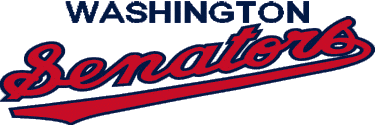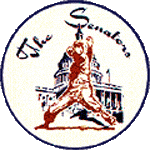Washington Senators


Historical Moments:
1960: After years of struggling with attendance and fighting with baseball and city officials, Calvin Griffith, the owner of the original Senators, gets approval to move. The approval comes as the American League decides to expand one year earlier than planned. Part of the approval comes because one of the two expansion teams will be placed in Washington to replace the charter American League franchise that moved to Minnesota. Although the team will pick up the old name Senators, it will be as an expansion team, since the team that moved to Minnesota was allowed to keep its history.
1961: On April 10th, in front of 26,724 at Griffith Stadium, President John F. Kennedy throws out the first pitch, as the “New” Washington Senators lose to Chicago White Sox by a score of 4-3. The team would make losing a habit, as they would finish in last with a record of 61-101. One bright spot is pitcher Dick Donovan who captures the ERA title a 2.40.
1962: On April 9th, the Senators beat the Detroit Tigers 4-1 in their new state of the art ballpark District of Columbia Stadium. The new stadium does nothing to help the team, as they finish in last again with a woeful 60-101 record. The highlight of the season came in September when pitcher Tom Cheney went 16 innings in a game against the Baltimore Orioles. Cheney would 228 pitches on the way to striking out 21 Orioles. This would establish a new record for strikeouts in an extra-inning game. In collecting his record, Cheney would strike every Baltimore Oriole out at least once. The game would finally end in the Senators’ favor when Bud Zipfel hit a home run in the top of the 16th.
1963: The fortunes of the Senators continue to sag as for their third year in a row as they finish in last, and post a horrible record of 56-106. In an attempt to bring an experienced winner to Washington, former Brooklyn Dodgers great Gil Hodges is named manager in the middle of the season. Still, the new hire has no effect as the Senators continue to lose.
1964: The Senators hit the century mark in losses for the fourth year in a row posting a 62-100 record while finishing in ninth place.
1965: In a multiplayer deal with Los Angeles Dodgers, the Senators acquire outfielder, Frank Howard. The slugger becomes an instant fan favorite as he launches mammoth home runs. However, the movie does not improve the team that much, and they still finish well below .500 but avoid 100 losses for the first time finishing in eighth place at 70-92.
1966: The Senators avoid 90 losses for the first time in franchise history while finishing in eighth place with a record of 71-88.
1967: The Senators continue to improve for the third year in a row, finishing in sixth place with a 76-85 record. Leading the charge towards respectability is Frank Howard, who slams 36 home runs. One game that sparked interest was on June 12th when the Senators beat the Chicago White Sox 6-5 in 22 innings. The game lasted 6 hours, 38 minutes, and ended at 2:43 am, which caused the American League to adopt a curfew stating that no inning may start after 1:00 am. This rule, which was never adopted by the National League, would last 33 years.
1968: With Gil Hodges leaving to manage the New York Mets, the Senators fall back into last place with a 65-96 record under the leadership of Jim Lemon. Despite the terrible season, Frank Howard wins the home run crown by smacking 44 Long Balls.
1969: Opening Day draws one of the largest crowds in Senators’ history, as DC Stadium is renamed RFK Stadium in honor of former US Senator, and Attorney General Robert F. Kennedy, who was assassinated in 1968 during a run for the presidency. Another draw to RFK Stadium was new Manager Ted Williams, who many consider the greatest hitter of all-time. The move worked out as the Senators finish above .500 for the first time while finishing in fourth place in the American League Eastern Division with a record of 86-76. Leading the way is Frank Howard, who finishes with 48 homers and places fourth in the MVP voting. Meanwhile, Dick Bosman wins the era title at 2.19.
1970: Despite another stellar year from Frank Howard, who captures two-thirds of the Triple Crown with 44 homers and 126 RBI, the Senators fall back into last place with a record of 70-92.
1971: In an attempt to help the sagging franchise, the Senators trade several up and coming players to the Detroit Tigers for two-time Cy Young winner Denny McLain. McLain, who missed most of the 1970 season because of various suspensions, and injuries, is on a slippery slope that would see his career and life go down in ruins. The move is a big failure as McLain, who won 30 games in 1968, loses 22 in his only year in Washington. The worst news for the Senators’ fans had nothing to do with their fifth Place 63-96 finish. For years the Senators had trouble-drawing fans to their stadium; it t led to the departure of Washington’s original team to Minnesota in 1960. The American League did not want to lose its Washington presence expanded right away, replacing the old team seamlessly. After a decade, the new team was on the verge of leaving and baseball, and the city of Washington did not have any quick expansion options. Part of the problem preventing success in Washington was the Baltimore Orioles, who cut their fan base in half and was one of baseball’s best teams. The Senators meanwhile, who were struggling at the gate, received an offer from Dallas Fort Worth to move to Texas. Dallas-Fort Worth, for several years, had been trying to lure a Major League team. In 1962 Major League officials halted an attempted move by the A’s. In 1969, the metro area fell short in an attempt to gain one of baseball’s four expansion slots. This left city officials just one option was to lure an existing team. So a Minor League Stadium on the Turnpike in nearby Arlington was expanded. With the Senators struggling in Washington owner Robert E. Short began looking for other options. When Dallas offered a reported multi-million dollar up-front payment for TV and radio broadcast rights, Short asked American League owners permission to make the move. With Baltimore already entrenched in the area, owners would have no problem with the move, and ten days before the end of the season, it was approved.
1971: With the move to Texas approved a 71-year tradition of American League Baseball in the Nation’s Capital was coming to an end. In the 71 years, although the teams did not compete much, many fans stuck with them. It was once said, “Washington first in war, first in peace, last in the American League.” Despite this, many fans stood by them, and anyone who played with Senators was a fan favorite. Washington fans did enjoy one championship in 1924, and a whole generation grew up watching Walter Johnson, who many consider the greatest pitcher ever. However, most fans had to suffer through a 90-loss last-place season with players that would never get past the minors in other organizations. Washington Senators baseball was also a popular stop for the lawmakers of the country in their 71-year history 11 Presidents of the United States, three Vice Presidents, a Speaker of the House of Representatives, a Canadian Prime Minister, and a “first son-in-law” all helped open major league seasons by throwing out the first ball for Washington baseball. Ten years earlier, a similar move took Washington’s original team, but expansion kept baseball in old DC. This time that was not going to happen, so the September 30th game against the New York Yankees would likely be the final game in Washington baseball. In the last game at RFK Stadium was filled with angry jilted fans that continually interrupted play by throwing things onto the field. This would continue throughout the game, and into the ninth inning where the Senators were leading. The fans would then take a turn for the worse by streaming on to the field and started a riot with two outs in the ninth. Order was unable to be restored, and the game was forfeited, bringing an ugly end to a wonderful 71 years.
1972-2005: In an attempt to lure baseball back to Washington, city officials attempted to bring the National League’s Padres from San Diego. It looked like the move was close to happening, but Orioles ownership and National League owners were able to block the move, as McDonald’s founder Raymond A. Krok was brought in to buy the team to keep them in San Diego. Over the next 30 years, Washington and its suburbs would try to land several teams even trying to land an expansion team, but they would always come up short. Finally, in 2004 the Montreal Expos after years of playing in limbo announced plans to move to Washington, where they became the Nationals in 2005, bringing National Pastime back to National Capital.
©MMVI Tank Productions. Stats researched by Frank Fleming, all information, statistics, logos, and team names are property of Major League Baseball. This site is not affiliated with the Washington Senators or Major League Baseball. This site is maintained for research purposes only. All logos used on this page were from Chris Creamer’s Sports Logos Page.
Page created on August 13, 2001. Last updated on April 11, 2006 at 11:50 pm ET.

